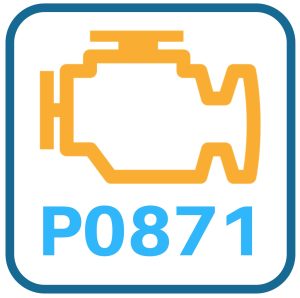
P0871 is a somewhat rare diagnostic trouble code. While your Mazda 3’s check engine light will come on, this particular code indicates that there’s something wrong with the transmission, specifically the transmission fluid pressure sensor switch “C”.
It’s a generic code, so P0871 has the same definition for any vehicle made for the 1996 model year and up. Before doing anything, check your 3’s transmission fluid. Make sure that it is full and doesn’t look burnt or otherwise discolored.
Abbreviations used in this article:
- PCM– Powertrain Control Module, this is the main computer module with the engine and transmission control in one unit.
- TCM– Transmission Control Module, the TCM controls the shifting of the transmission and is separate from the engine control module. Your Mazda 3 will either have a PCM or a TCM. And, for the purposes of this article, they are interchangeable.
- TFPS– Transmission Fluid Pressure Sensor
P0871 Definition: Transmission Fluid Pressure Sensor/Switch “C” Range/Performance

Here’s the definition of P0871 for the Mazda 3 broken down by its individual parts.
Transmission Fluid Pressure Sensor/Switch
The TFPS has two primary jobs:
- Convert the transmission fluid pressure into a signal that the PCM (or TCM) can use to control shifts.
- Verifies that the PCM/TCM’s request for a transmission shift has occurred.
Circuit “C” Range/Performance
The TFPS converts the hydraulic pressure data into a voltage signal that your 3’s TCM/PCM can use to control the transmission. P0871 occurs when this signal is out of the normal operating range for this signal.
So you have two scenarios:
- Your 3 has too little or too much transmission fluid.
- The sensor itself is bad.
P0871 Symptoms: Mazda 3
Here are the most common symptoms associated with P0871 in the Mazda 3:
- Limp Mode– Your 3 will shift differently and won’t have access to all of its gears.
- Check Engine Light– There will often be other codes that occur with P0871. They will usually be related to voltage and power.
- Erratic Shifting– Shifts may feel soft (RPM slowly drops during the shift), or they may feel too harsh (abrupt drop in RPM).
We don’t recommend driving with this code, as it can be an early warning of transmission failure.
Mazda 3 P0871 Causes + Diagnosis

Diagnosing P0871 in the Mazda 3 can be challenging, due to the location of the TFPS sensor and the wiring associated with it.
1. Check for Other Codes and TSB’s
The first thing you want to do is check for other diagnostic codes. They can provide valuable clues to what’s going on inside your transmission.
TSB’s are technical service bulletins. Mazda uses them out to deal with common and well-known vehicular issues. Check to see if there are any related to your problem. You can get them from the NHTSA website. It is possible that this code was thrown with the very similar P0841.
2. Check the Transmission Fluid
If your 3’s transmission fluid is too low or too high, it can throw this code. It only takes a second to look. Make sure you check it on a level surface to get a good reading.
2. Inspect the TFPS Wiring
The next thing you’re going to want to do is to inspect the wiring going to your 3’s TFPS. If it’s burnt or damaged, you’ll need to replace/repair it.
After that, clear your 3’s trouble codes and see if P0871 comes back.
Whether or not you’re going to be able to access the TFPS is going to determine whether most people can continue diagnosing P0871. Sometimes the TFPS can be accessed from the outside of the transmission. You may need to open the transmission, which means sending it to a transmission repair shop.
Wiring issues are the most common cause of P0871. Take your time and make sure that the harness is in good shape.
3. Other Causes
- Bad TFPS Sensor
- Internal transmission issue
- Low transmission fluid
- Bad TCM/PCM
While a bad TFPS sensor is highly likely, make sure that the voltage going to it is correct and doesn’t change when wiggling the harness before replacing it.
Conclusion
Diagnosing P0871 is relatively straightforward. The real issue is getting to the wiring and TFPS. Good luck fixing your Mazda 3!
